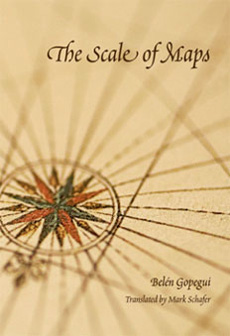
Sergio Prim, protagonist of Belén Gopegui's first novel, The Scale of Maps, is a shy, middle-aged geographer thrown into a hallucinatory quest by the romantic advances of his coworker, the somewhat younger, vibrant Brezo Varela. Fearing heartbreak, he searches for a concrete way to locate a refuge where he and Brezo might be safe from disillusionment. Prim's need to map that refuge raises questions about the nature of space and our understanding of it, as well as about love, reality, and storytelling.
Originally published in Spanish in 1993, The Scale of Maps is the first of Gopegui's seven novels to appear in English. La escala de los mapas won both the Tigre Juan and the Iberoamericano Santiago del Nuevo Extremo prizes. Made up of short chapters of varying length, the novel calls attention to itself as object. Words are consciously selected—not arbitrary—and the reader's attention is drawn to the visible presence of the printed letters, their size, scale, and spacing, much as one might notice the marks or legend on a map.
The novel places the reader, uncomfortably, within the disjointed experience of Sergio Prim. We see through his eyes—the more so, paradoxically, given the continual shifting of perspective between first and third person narration. The novel is full of arresting images and sentences to share aloud, and Mark Schafer's word choices bring the book into a suitably stark and unsettling English. One memorable description: "I had gotten out of bed in the key of Brezo, and all day Monday resembled a mountain pass she had seized." As Prim observes of the shift between nook and look, "one letter can alter a man's entire life." Prim is struggling to delineate his own experience, but that letter-by-letter shift is also at the heart of translation.
Prim calls the space he is looking for a "hollow," which seems to me an apt rendering of the Spanish hueco, which might also be a hole or a cavity; hollow is more forgiving, more spacious in its ambiguity, which is exactly the tone this novel requires. Moreover, as well as being a possible refuge, the hollow begins to describe the ongoing presence of the absent lover, continually present in imagination, in memory, in the physical sensations of longing.
This is a novel to read not for plot but for the movement between moments, the startling observations, the ambivalence of a narrator by turns sympathetic and maddening. Though Prim is not an unheard-of surname in Spanish, it seems particularly well-suited to this character in English. It is often difficult to tell just what is real, what has happened and what has been imagined. Prim himself observes that to imagine is also a way to possess. Seldom explicitly stated, this understanding is an important thematic thread in the novel, as the reader also comes to possess an imagined Sergio Prim. The lonely, unbalanced narrator is at times so wholly persuasive that the reader is caught up in the twisting logic of his loss and his hope:
The use of "maiden" in English carries not only the necessary gender information, but a welcome echo of Donne's "no man is
an island," a subtle, geographical note that both reinforces and clarifies Sergio Prim's predicament. Sound is important
to narrative as well as to poetry, and the attention to sound is a strength of Schafer's translation. The Scale of Maps
is a meditative, obsessive novel, rewarding in the clarity of its expression and the provocation of its questions. As the
end of the novel makes clear, it is the posing of those questions—the journey—-that is most important. My favorite
line, perhaps, is the last: "Lift your hand and watch space stop."
The first two chapters of this book can be read on the World Literature Today's website.

Amalia Gladhart is Associate Professor of Spanish at the University of Oregon. She has
published widely on contemporary Latin American theater and narrative, and her poetry and short
fiction have appeared in journals such as Iowa Review, Stone Canoe, Bellingham Review and Permafrost.
Her published translations include Beyond the Islands and The Potbellied Virgin, both novels by
Alicia Yánez Cossío, and "Reunion," by Ecuadorian writer Gilda Holst. She is currently working on
a translation of short stories by Argentine writer Angélica Gorodischer.

Belén Gopegui was born in Madrid in October 1963. She studied law at university and worked for several newspapers before, in 1993, she burst onto the Spanish literary scene with her first novel, La escala de los mapa [The Scale of Maps]. The critically-acclaimed novel won both the Tigre Juan Prize and the "Santiago del Nuevo Extremo" Iberoamerican Prize for First Novel. Gopegui has published six more novels, and her work has been translated into many languages.

City Lights, paperback, 9780872865105